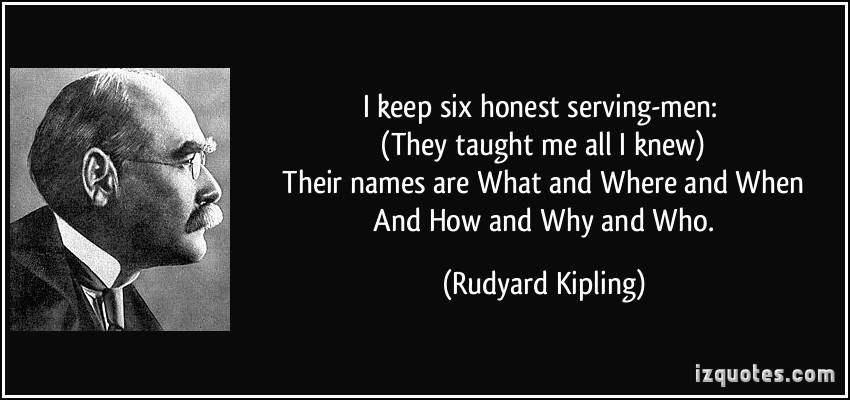Asking the right questions before taking over a Project
I often get asked as to what is one supposed to do when asked to lead a project which was handled by someone else and is not doing too well. While this is usually viewed as an opportunity to showcase your Project Management skills you need to make sure that you have what it takes to conduct a successful rescue mission. The simple adage to follow is "When in Doubt, ASK". The questions to ask were actually highlighted by Rudyard Kipling more than a century ago.
WHY
You as the Project Manager Designate need to understand why the management wants to continue with the project and not just abandon it ?. More often than not we are faced with situations where the Business Sponsor and the Delivery Executive have conflicting goals and views, so it is important to get their individual perspectives :-)
Another important question is WHY is the Project in the present state? Is it a person, group of persons or unfavorable circumstances, redundant technology, change of legislation, revised corporate strategy, M&A, ad-hoc changes in leadership or ….?
WHAT
What do you need to change that is going to make it work this time? What would define project success? Has the definition changed. What needs to be done differently? You will not solve a problem with the circumstances that caused it. Understand what changes are needed, what needs to be added, what should continue and what's no longer relevant.
WHEN
WHEN do you need to do what? You need to agree on timelines and have them incorporated in a Revised Project Charter.
It is important to have clear plans with dependencies and milestones. It is equally important to understand that plans and timelines are not cast in stone. At best they are an estimate and a guideline. If circumstances change, if things don’t work, if someone has a better idea, you should be flexible and open. Inflexibility is one of the key reasons for project failures. If things are simpler than you thought, shorten the timelines, if they get harder ask for more time. Asking for more time is always better than missing a deadline. Telling your hosts you are arriving a week earlier is always better than landing up at their door unannounced.
I completely agree that flexibility does not mean elastic targets and continuously evolving plans. You must understand that when the circumstances change or if you realize you were wrong in your estimates, you have to change course and the sacred project plan. You need to realise that meeting the project goals and clear stakeholder communication is far more important than the MPP, for everyone on this planet, with the possible exception of those on Microsoft Projects sales team.
(MPP and other such software are excellent tools but they are just a means to the end and not the End in themselves. Quite a few Project Leads and Managers I met are overly attached to their plans and hence the emphasis.)
HOW
You need to have conversations with the project sponsors on HOW the project is going to be funded. You would need agreement on the milestones for release of funds and other resources. Discussions on project execution, tools and technologies, logistics and resources and communication and escalation need to happen with all the stakeholders. There needs to be clarity on HOW the the project would be governed and what metrics would be used to track and measure progress as well as success by the Oversight Committee
WHO
WHO needs to cover all the stakeholder communities. You should have a conversation with representatives from each, to understand the various perspectives on the current state of the project from the Sponsors, Governance and Oversight Committee, Project team members and finally the User Community. The Project Delivery Team could be a challenge if the team is outsourced and vendor managed. You need to convince them to speak their mind freely and without fear. This is a tough ask, as such teams are usually prone to saying what they think you want to hear, rather than what they really think.
Resources and team composition would be a potential area of friction while answering the WHO question in terms of staffing. In my experience a “can do attitude” and “commitment to team rather than self” would outbeat skills 9 times out of 10. The only exception would be where you need to live with difficult individuals and pander to their whims, because of their unique and irreplaceable skills, which are critical to the achievement of project goals. Repeat that sentence to yourself thrice and you would quickly realise whether or not it really applies to the individuals under consideration :-)
WHERE
WHERE will the project team be located and where are the delivery locations situated? This is a critical question because in today’s global environment, multi-location projects bring up complex "soft" challenges like language, culture, visas, prejudice, connectivity and infrastructure which surprise... surprise, still tend to be brushed under the carpet. It would be important to know and understand the impact of these factors as well as the influence of cost cutting measures and geographical advantage on the present state of the project.
The above is a summary of what I have found these useful in taking over projects as well as in conducting mid-term project reviews to drive course correction and hope they are helpful to you. Please feel to share your personal insights and experiences as well.
